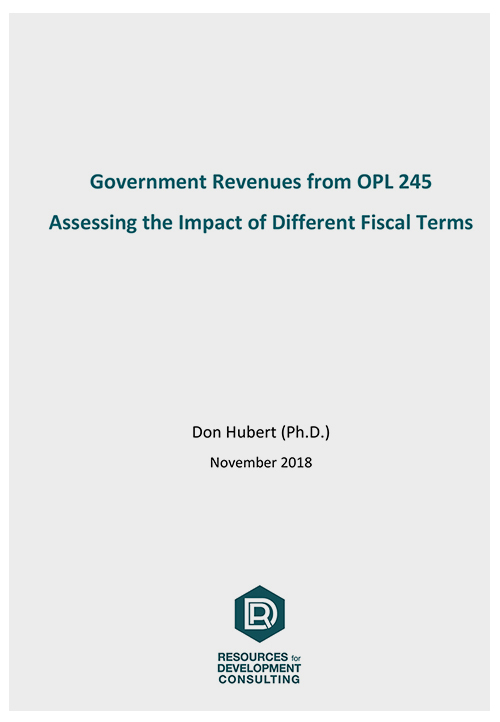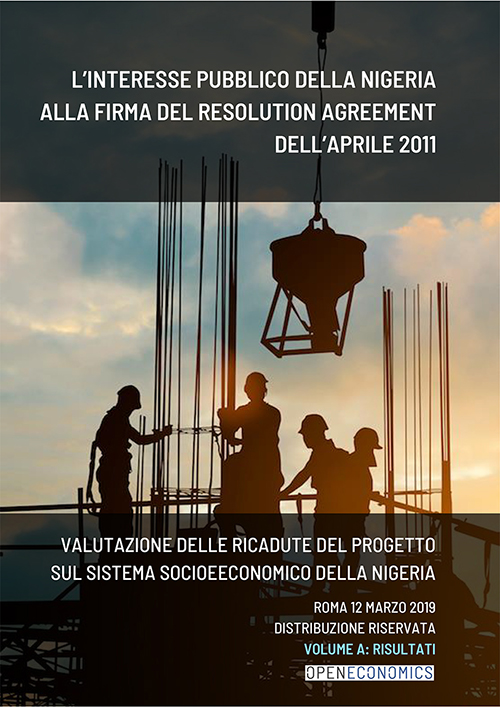
OPL 245 delivers great benefits to the Nigerian population

As shown by OpenEconomics research centre the development of the block would bring significant economic and social benefits to the Nigerian population.
The truth
The OpenEconomics research centre showed that the development of the OPL 245 block, if initiated, would imply significant economic and social benefits for the Nigerian population.
In November 2018, the NGOs Re:Common, Global Witness, and The Corner House and Nigeria-based HEDA entrusted the company Resources for Development Consulting with an analysis of the impact of the OPL 245 operation on the Nigerian economy. According to this analysis, the agreement between Shell and Eni and the FGN would reduce Nigeria’s expected incoming taxes by a total of between $4.5 million and $5.9 million (Resources for Development Consulting – Government Revenues from OPL 245. Assessing the Impact of Different Fiscal Terms, page 27).
GDP: +$41 billion
In March 2019, Eni asked OpenEconomics, a spin-off of the Faculty of Economics at the Tor Vergata University in Rome, headed by Professor Pasquale Lucio Scandizzo, to assess the impact of OPL 245 on the Nigerian economy.
Over the course of the 25-year project, OPL 245 could lead to a cumulative $41 billion increase of Nigeria’s GDP of at 2011 prices, which means an average $1.64 billion increase a year, with a 32 per cent capital return.
The country’s tax revenues would increase by $3.9 billion at present values, while indirect benefits would amount to $10.2 billion.
Key benefits for people
Despite the delays,and assuming production began in 2019, the estimated positive effects would still be largely achievable. In terms of social benefits, the OPL 245 project will help the country achieve the UN Sustainable Development Goals (SDGs). These include:
- 1.2 million children obtaining access to a five-year primary education cycle
- 200,00 new jobs
- 600,000 people receiving safe and sustainable energy for the first time
- an increase in food consumption by poorer families, valued at more than $107 million.
Benefits of the agreement
The agreement by which Eni and Shell acquired the exploration rights to Block 245:
- promptly provided the Nigerian state with the $200 million signature bonus
- broke the deadlock in negotiations that had been in place for more than 10 years
- settled the many pending court litigations between the Nigerian State, Shell, and Malabu
- established the conditions to finally develop Block 245
- introduced back-in rights1, which had not previously been included (worth more than $400 million)
Regarding the introduction of the back-in rights, as can be seen from the letter sent to Eni by the Nigerian Ministry of Oil on 14 June 2018, the Federal Government of Nigeria expressly declared that it wanted to convert the Oil Prospecting Licence (OPL) to an Oil Mining Licence (OML) so the field could be brought into production, and that it wanted to exercise the back-in rights1, in confirmation of both their viability and the economic gain to be derived from them.
Note
1 Back-in rights represent the right to claim a 50 per cent share in the profits of the reservoir at any time without having to bear the corresponding industrial risk (borne solely by Eni and Shell). This clause allows direct access to the financial benefits derived from developing the block without any capital investment risk and, from an industrial perspective, provides access to local companies, allowing to pass on techniques and expertise to support the country’s development (the clause that provides for back-in rights is included in Article 11 of the Block 245 Resolution Agreement).



















 Resources for Development Consulting report
Resources for Development Consulting report






